Unbridled extraction of sand, gravel, and boulders from the river beds in Dhading with the involvement of local representatives is not only destroying the ecosystem of the rivers, it has had a serious sociological and environmental impact. Several tippers strip the river beds of sand daily from the mining sites, close to several settlements and highways hinting an unholy nexus between some parliamentarians, local representatives, and the contractors.
-Manish Duwadi : Centre for Investigative Journalism-Nepal
One evidence of unholy nexus in this business is Krishna Hari Shrestha, Chairperson of Galchhi Village Municipality, who got elected in the 2017 local elections representing the then CPN-UML. One of the six investors in the Maheshdobhan-based Jaya Panchakanya Aggregate crusher business, Shrestha proposed the opening of a new track up to the Galchhi village ward-6-based sand mine to ensure unhindered transportation of sand. This was his first decision soon after he assumed the post of the village municipality chairperson.
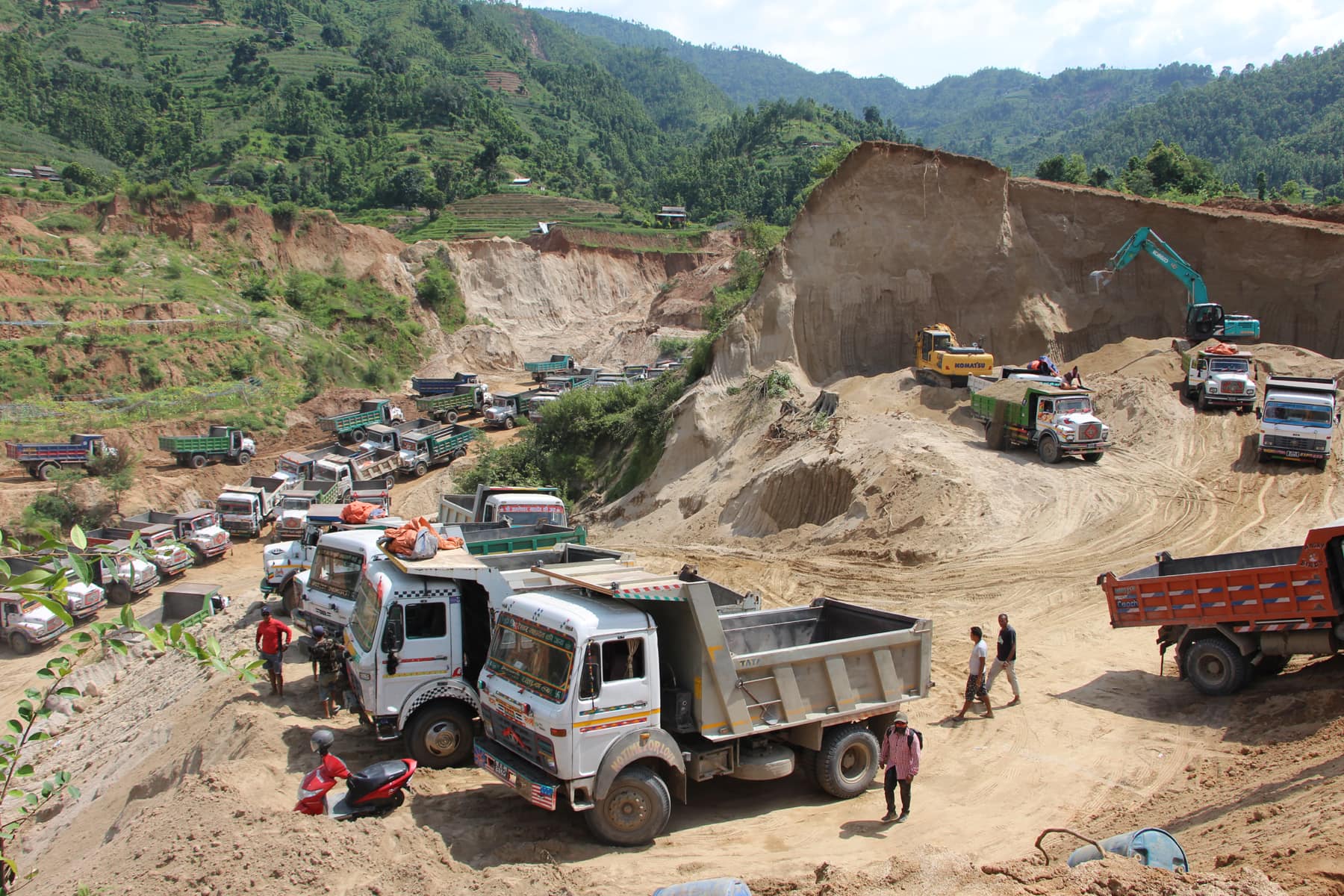
tippers lined in Pida Dharapani, Gajuri village municipality to carry crude sand. Availing Unique Mineral processing center’s license to operate sand mining in local’s land.
Photo: Manish Duwadi
The story does not end here. He also tried to lure the locals promising to provide two tippers of sand to the earthquake victims. However, Shrestha’s plan to open up the track could not materialize since Rajan Shrestha, ward chairperson, opposed to the idea of distributing sand to the earthquake victims of other wards.
Nepali Congress local leader Binod Karki, too, is one of the investors in the same crusher business registered at the Department of Small and Cottage Industries in the name of Anil Shrestha, the son of Krishna Hari. After Krishna Hari got elected, his son Surendra has been taking care of the business.
Meanwhile, Krishna Hari Shrestha also owns the KBS Construction and Suppliers, registered at the Galchhi municipality ward-6. The KBS Construction, which trades raw sand, has been making millions of rupees by recommending the small sand businesses start-ups. According to the provision, such a start-up business needs a recommendation from an established sand mine dealing with raw sand.
According to the Small and Cottage Industries Development Committee, Dhading, out of the registered 50 crusher industries in the district, 33 are currently in operation. However, none of them meet the government criteria. Meanwhile, the record shows that around 81 sand processing plants (aka Firfiray) have been registered in the district. However, more than 200 unregistered such plants have been operating at the Trishuli River banks. Despite the district administration’s initiatives to shut down the illegally operated mines, it failed because of the political pressure. In fact, the administration has become toothless to bite those illegal plants – mostly operated by local political leaders.
Leader’s leaders, representatives
Prabhat Kiran Subedi, Nepali Congress candidate from Dhading constituency-1 “B” in the provincial election, is not only an investor in the crusher and sand mining industry, he also owns the Gajuri-based Unique Sand Washing Industry, and Unique Mineral Processing Center, which supplies raw sand to almost all processing centers located along the Prithivi Highway.
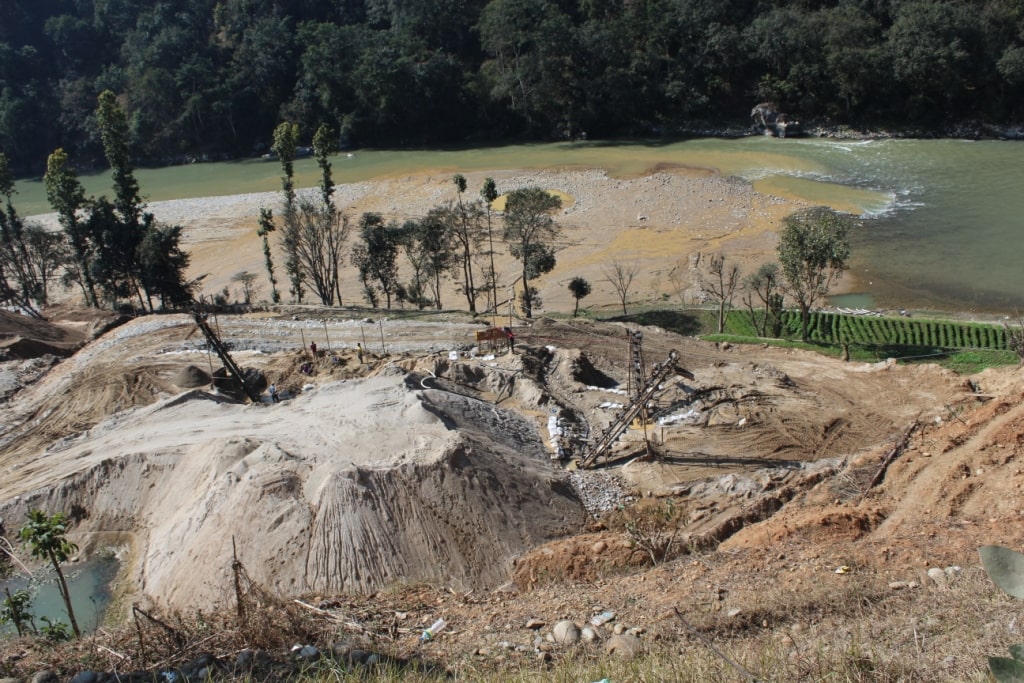
Sand processing centre operating without registration at Trishuli River’s bed.
Likewise, parliamentarian Bhumi Tripathi has an ‘indirect’ investment in the Gajuri-based Malekhu Aggregate, operated by Ram Krishna Regmi, and Sandesh Tripathi, Bhumi’s cousin.
The list goes on. Ganesh Lal Shrestha, then Maoist (Center) local leader owns Indrayani Crusher Industry in Belkhu Bagar. Shrestha was fully backed by Salikram Jamakattel, Law Minister of Province-3 during the initial phase of the plant’s operation.
Another such industry with politician’s ownership is the Malekhu Construction Materials Industry based at Tundi Dovan in Gajuri. In fact, Prakash Pandey, the son of former minister and province lawmaker Rajendra Pandey, owns this crusher industry currently looked after by former president of Youth Force Dhading, Samundra Sagar Silwal, and Rajan Kandel. After a brief closure, the industry has resumed its operations.
Biswa Aryal, Nepali Congress leader, too, has an ‘indirect investment’ in the Everest Aggregate at Thakre village municipality in Dhading. The record at the Cottage and Small Scale Industry at Tinthana, Kathmandu shows that Dhruba Ratna Manandhar owns the business.
As many as 21 crusher plants are currently in operation in Thakre village municipality. Since electricity line was disconnected in all the crusher industries, Ram Kumar Acharya, Chairperson of Thakre village municipality had taken the initiative to recommend the Nepal Electricity Authority in Dhading to resume the power supply to the plants by July.
The owner of Gajuri-based Pindeswori Sand Processing Industry, Ramesh Shrestha, also the Principal of Munal Academy Boarding School, along with then UML leader Madhav Bhandari, and teacher Jayaram Dhungana were accused of ‘stealing’ sand from the premises of the Aadarsha High School, Gajuri, and were fined with Rs. three hundred thousand in early 2018. Then Maoist (Center) local leader Karna Bahadur Lama was fined for purchasing the sand from them.
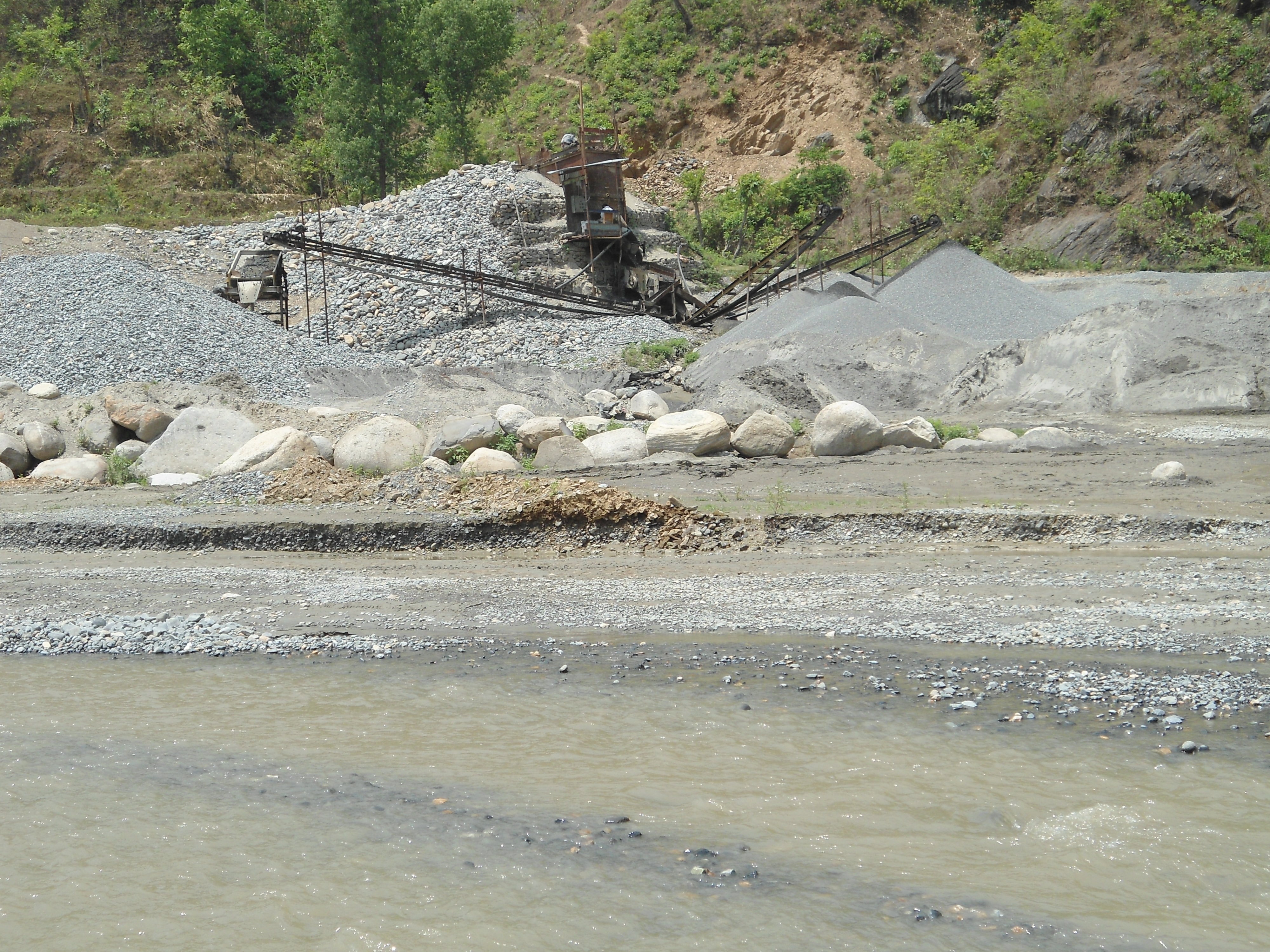
Crusher industry operating on edges of Aagra River, Thakre Village Municipality
The government has put on hold the renewal of crusher industries since 2015 for “affecting the reconstruction process” after the massive earthquake. However, several crusher industries, failing to renew but meeting the necessary criteria, have been granted the permission to operate. Meanwhile, despite failing to meet the criteria, most of the crusher plants in Dhading district are still operating. The administration, being aware of such illegal operations, has been a mute spectator before the political influence.
Following several complaints by the locals, the District Administration Office ‘inspected’ the crusher and sand processing centers to discover that the crusher industries were misusing the electricity by supplying it to other industries. According to Dholraj Dhakal, monitoring officer at the district administration office, Dhading, around 32 such industries, which had produced their land registration certificates to connect electricity lines, have nowhere in the scene. This clearly shows that the owners operate such industries in some other areas illegally. Dhakal said that operators of such industries even had arranged to install high-capacity transformers on the basis of mutual understandings between them. Majority of the small-scale industries, which have connected electricity to run rice mills, or make blocks have been operating sand processing industries. Upon finding such irregularities, the electricity authorities had on March 6, 2018, disconnected the lines of such industries connecting electricity illegally. However, it did not last even a month since the authority could not endure the pressure coming from the political leaders and parliamentarians.
Authorities least bothered
The provision of the Environment Protection Act and Regulation 1997 requires all mines and crusher industries to mandatorily undergo the Initial Environmental Examination (IEE), and the Environmental Impact Assessment (EIA) to avoid adverse environmental impact and threat. The Supreme Court had on August 6, 2010, had given a verdict to halt all stone crushers and mines posing a serious threat to the local environment threatening the existence of important biodiversity, human settlement, roads, and water source of the area. However, the verdict has not been implemented yet.
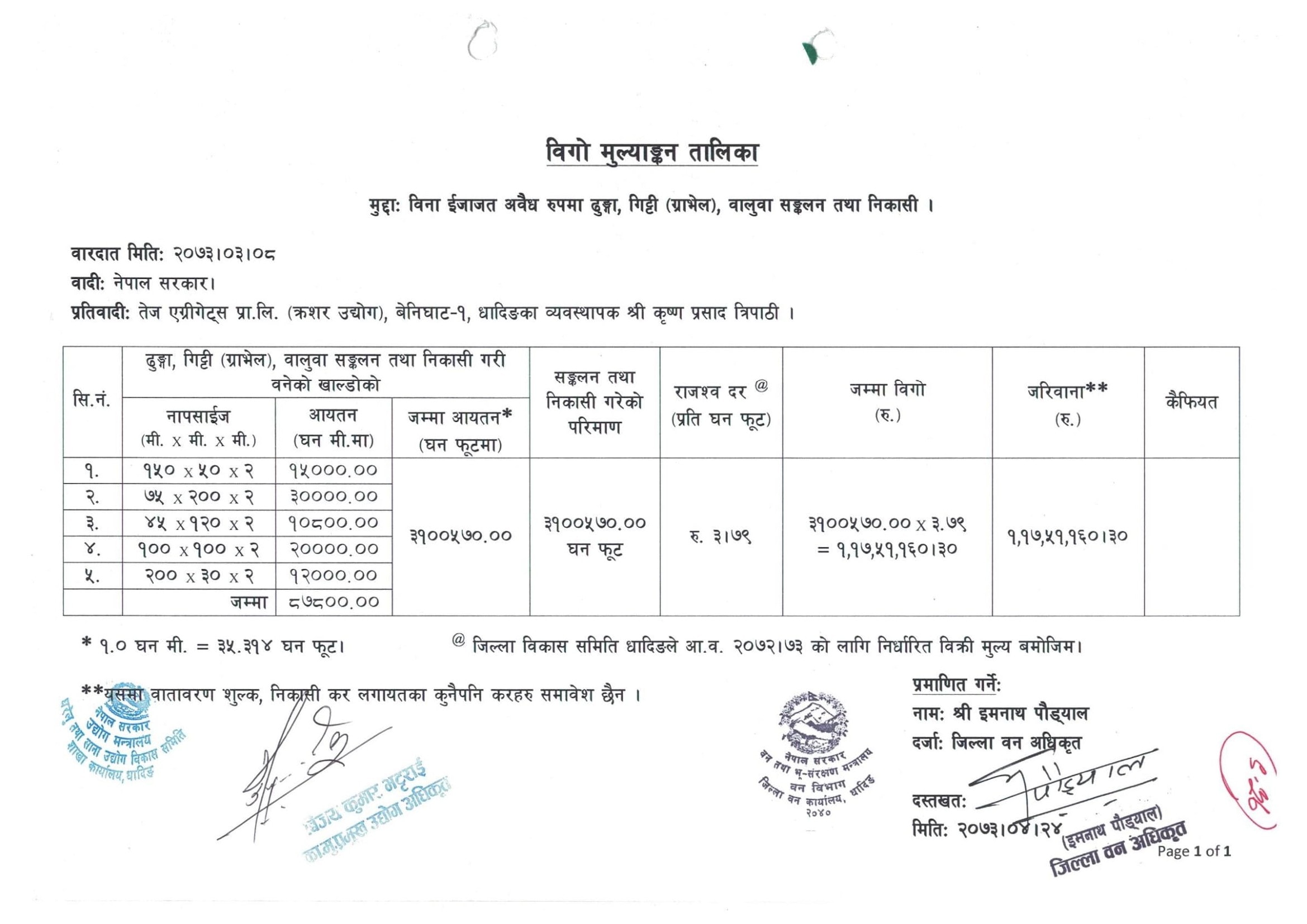
Claimed amount from Tej Aggregate after field inspection. Rather than taking actions based on the report, DAO has gulped the evidence.
Entrepreneur Krishna Hari Shrestha, who is also the chairperson of Galchhi municipality, denies the accusation of violating the government criteria. He instead blamed the government authorities for putting unnecessary pressure on the entrepreneurs. Likewise, crusher entrepreneur Subedi claims that all crushers, except some in the Terai, will be shut down if they follow the government criteria in all terms.
Turning deaf ears to the court’s decision, the people’s representatives have implemented their own criteria on crusher industries and sand mining. A district-level committee, headed by chairpersons of local levels and district coordination committee, drafted the criteria challenging the government’s criteria. Stating that the electricity lines have been connected by formulating local criteria for the time-being, chairperson of Galchhi village municipality Shrestha says, “Industrialists must move ahead by abiding the law at a time when the provinces are busy in formulating provincial laws.” Shrestha said that they have apprised the issue to law minister.
The authorization letter bans stone and sand mining within 500 meters from the highway. Besides, the letter also prohibits encroachment of public land to operate the mines. However, the stakeholders have set their own criterion that allows them to wash the sand within 100 meters from Trishuli River. Jagannath Nepal, chief at the district coordination committee said that this would have an adverse impact on the river and the environment. According to the criteria, such industries are not allowed to operate during the night. Nepal, however, warned of action on those industries polluting the rivers.
Majority of the crushers and mining in the district have been excavating sand and boulders by breaching the government criteria most of the time. The industries having the permit to excavate 17 to 24 tippers sand have been found to be excavated more than 200 tippers a day. Likewise, the plants acquiring the permission to wash sand up to three hours a day have been breaching the rules by working the whole night. For instance, the KBS Sand Processing Industry has acquired the permission to process 600 metric tons of sand in a year. A 6-tyred tipper can hold around 7 metric tons of sand while a 10-tyred tipper can carry 13 metric tons. However, sand processing plants usually process 80 metric tons of sand a day. These plants process more than 800 metric tons of sand in 10 days. The Gajuri-based Unique Minerals Industry Pvt Ltd, permitted to extract 110 metric tons of sand in a year, extracts 50 to 100 tipper of sand per day.
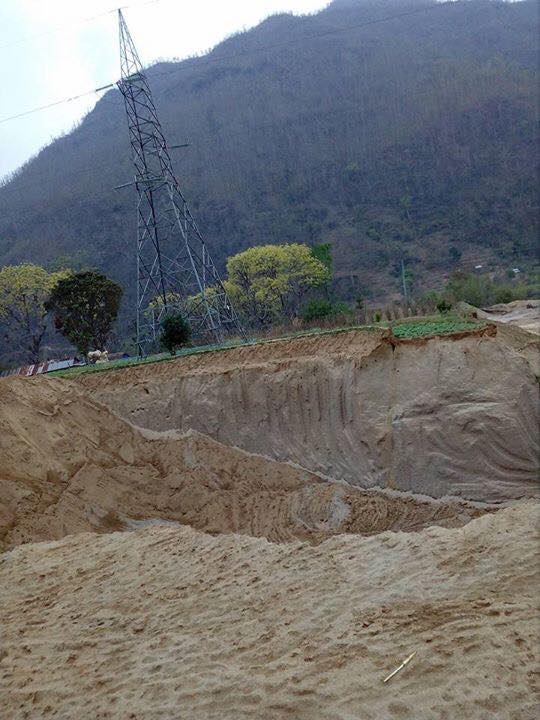
A high tension line in Gomati River in jeopardy due to sand extraction in Benighat, Rorang Village Municipality
That is not all. These crusher plants tend to encroach upon public land as well besides breaching the criteria, which disallows operation of such plants within 500 meters of the highway, within 100 meters from high-tension lines, and within 2 kilometers from the educational institutions, religious, cultural, security organs, forests, national parks and reserves, and human settlements.
Locals are victimized with the unchecked extraction of sand and rocks from the river beds. Locals of Rorang village municipality, Benighat registered complaints at the district administration office alleging the Tej Aggregate Crusher Industry, owned by the village municipality chairperson Bhuwan Tripathi of drying the drinking water source. The industry extracted around 87 thousand 798 metric tons of boulders and pebbles from the Trishuli River bed in a month without permission. The district administration office formed an investigation committee and found out irregularities. The committee of then the chief forest officer Yamnath Poudel and industry officer Bijay Bhattarai slapped a fine of Rs. One crore 17 lakhs after it found that the crusher industry had overlapped the name of Aagra River with Trishuli River by erasing the Aagra River from which the plant was supposed to extract rocks. However, the file has been missing following the transfer of CDO Biswo Prakash Subedi.
Two people lost their lives after being drowned in the pit formed after the extraction of boulders. Likewise, the son of Bhanu Bhakta Chepang of Rorang-2, Benighat died when he was drowned in a pit dug by the Malekhu Aggregate some three years ago. The case was dismissed after operators compensated the victim’s family with Rs. five hundred thousand. Similarly, Krishna Bahadur Tamang died after being electrocuted when he was on the way to water his field. The Malekhu Construction Equipment Industry had incautiously left a naked wire near Tamang’s field. The case was also dismissed after the operator’s agreed to pay a compensation of Rs. five hundred thousand.
Unfortunately, the directives of the Auditor General’s Office to immediately control the excavation of nine rivers, including Belkhu, Galaudi, Aagra, Malekhu, Mahadev Khola, and Kolfukhola, have been ignored. The office of the Auditor General had last year directed the government to control such crushers. The uncontrolled extraction of sand, gravel, and boulders from the rivers has not only been destroying the ecosystem of the rivers, it has adversely affected the individuals, communities, and the environment. Consider what Ek Raj Pathak, an elderly of Malekhu has to say: “The Malekhu River has affected the water table by some 20 feet after the 2050 floods.” One of the main reasons, according to him, is the uncontrolled extraction of sand, and boulders from the river.



